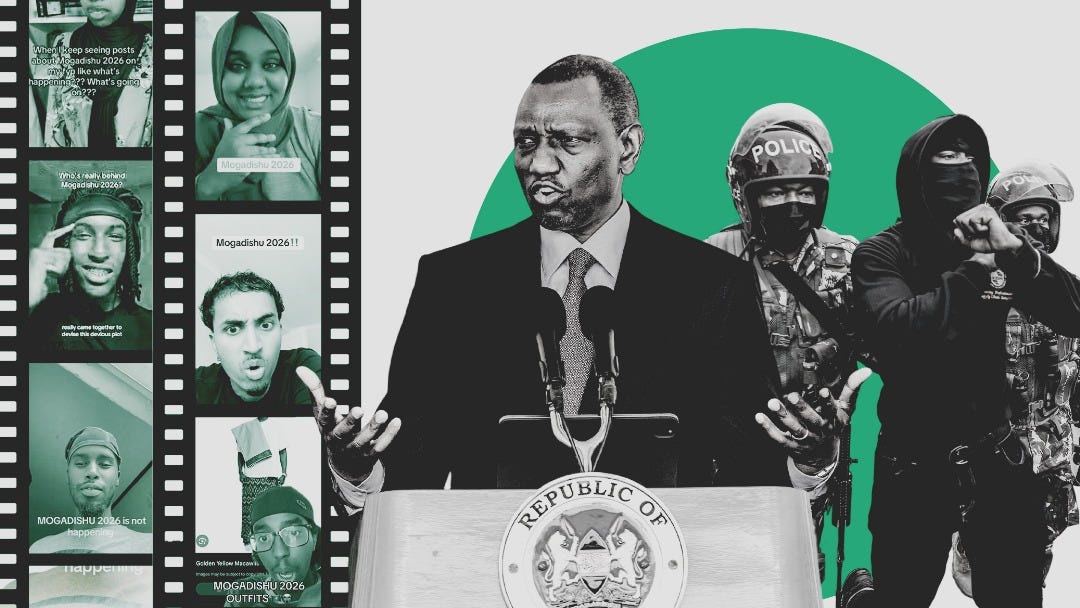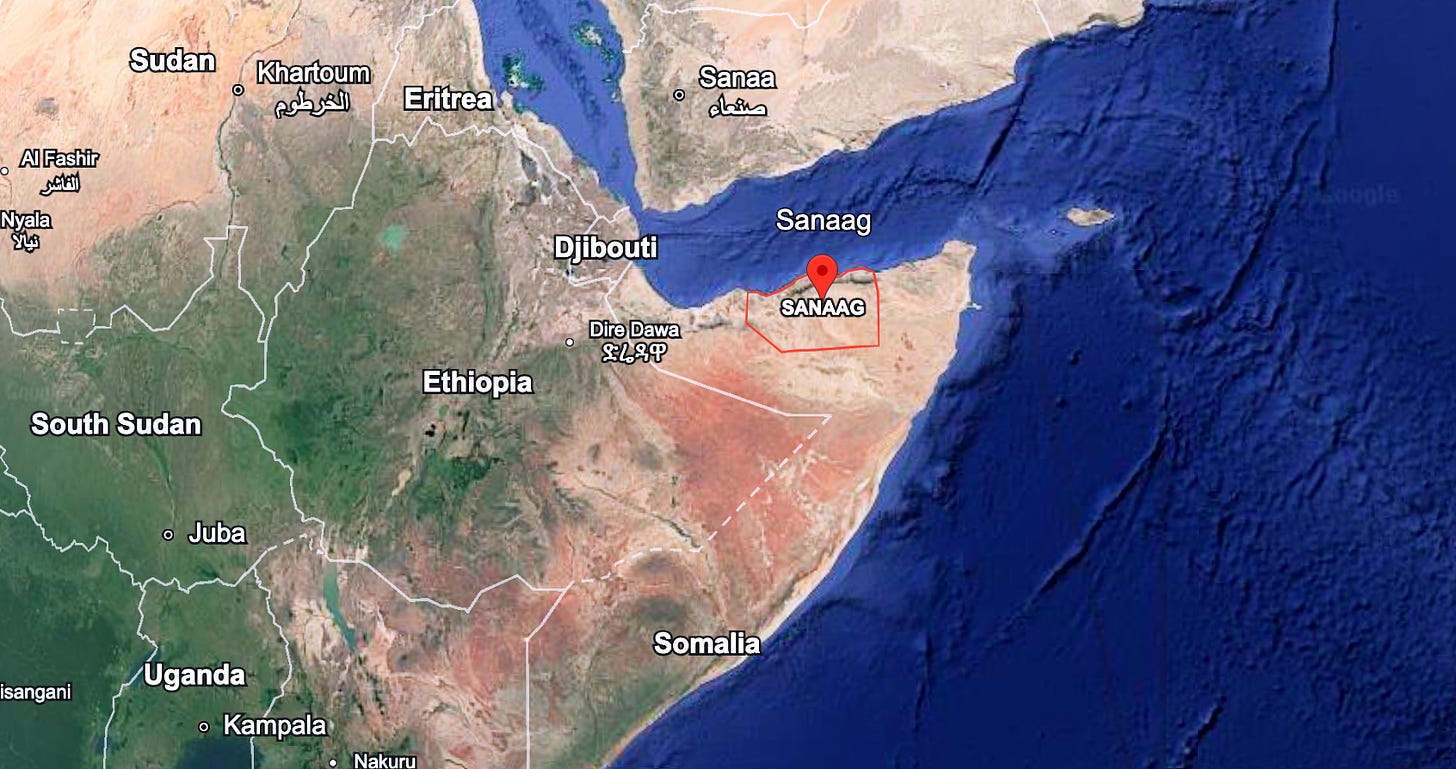Mogadishu 2026 (?!), negotiations with al-Shabaab and Kenya protests
Issue #5: Mogadishu 2026 is trending on TikTok as the next big tourist destination.

Good morning, Acacia readers! When we launched this newsletter, we were confident there would be enough happening each week to keep this dispatch interesting — and Somalis haven’t disappointed.
A TikTok craze has taken off over the past week, with loads of people on the app announcing they’re off to Mogadishu for a holiday next year. Mogadishu 2026. The videos are as funny as the idea is dangerous. @smallabdi is warning the would-be holidaymakers they’re “going to end up getting smoked”. If you’re wondering how al-Shabaab might react, one user’s already done a sanitised demo. It could get uglier.
 Tiktok failed to load.
Tiktok failed to load.Enable 3rd party cookies or use another browser
Another guy uploaded a video in which couldn’t contain his excitement at the thought of meeting his idol, Nimco Happy. Does she even live there? Others are busy drafting the lads who’ll make the cut for the trip, there is clothing advice — and yes, there are even AI-generated videos. One of them leans into a funny stereotype, with a character declaring: “Mogadishu ain’t got no laws”. It does.
Somali-American writer Najma Sharif has blasted American singer Azealia Banks, who last month randomly declared she’s a Zionist and bragged about not caring about the genocide in Gaza (her hatred runs so deep she recorded a song titled “Fuck Palestine”). As well as being loud and wrong about Gaza, Banks also doubled down on claiming Somalian was how you address Somalis and published a thread. Quick refresher: the people are Somali, the demonym is Somali — no one’s out here calling themselves Somalian. Sharif quite rightly called her a “dumbass”. Ilhan Omar shut down an AIPAC attempt to intimidate her over her objections to Israel receiving a lump sum of cash from the US. After AIPAC @’d her, she quote tweeted them, posting: “Tell Israel to use its own money…”
Banks also, somewhat bizarrely, brought up US airstrikes in Somalia — strikes which, according to our reporting, have been deadly for civilians. The US carried out yet another one this week, edging the total this year closer to 50. Donald Trump noted that there was a lot of “anger” in Africa this week, and having ordered more airstrikes than all other US presidents combined, he might do well to examine how he might be contributing to that.
And shout-out to Bihi Egeh, Somalia’s finance minister, who received the African Finance Minister of the Year award from African Leadership Magazine in London and boxer Ramla Ali who beat Lila Furtado in New York.
That’s the entrée. Now for a deeper dive into the stories we’re featuring this week from whether Somalia should negotiate with al-Shabaab, to Dahabshiil being handed a heavy fine by the UK government.
Security: To negotiate or not negotiate with al-Shabaab
In a recent interview, former Biden administration official Hamsa Warfa suggested that Somalia should consider negotiating with al-Shabaab, proposing that the Trump administration could help broker talks if the group agrees to expel foreign fighters and pursue its goals through democratic means. This idea isn’t unprecedented—President Hassan Sheikh Mohamud expressed openness to dialogue at the Oslo Forum last year. The former national security adviser and foreign minister, Abdirahman Yusuf Ali (aka Abdisaid Muse), also told BBC Somali last July that the US and Qatar had engaged al-Shabaab without informing Somalia’s government. In a X thread this week, Abdisaid Muse said the “real question is not whether to negotiate with Al Shabaab. It is how, when and for what purpose.” However, prominent Somali scholar Afyare Elmi wrote late last year that the government has never been truly committed to talks.
Observers will, of course, take note that Hayat Tahrir al-Sham (HTS) in Syria and Afghanistan’s Taliban—both of whom have taken control of their respective territories—have attempted to normalise their presence within the international system. Questions remain as to whether al-Shabaab can, or will, transform itself in the same way. Mukhtar Robow, a former deputy head of al-Shabaab, for example, defected in 2013 and is now the religious affairs minister—suggesting there is potential. However, it is a powerful al-Qaida affiliate which has said it has regional and global ambitions. Samira Gaid, a security analyst at Balqiis Insights, a Somalia-based think tank, tells Acacia that the “key test” for talks to begin in earnest would be them shedding the al-Qaida affiliation. But even that wouldn’t mean they’d engage Somali officials adds Gaid: [they] “would be ready for dialogue with external partners, not necessarily Somali officials, as they would be interested in full power consolidation, not power-sharing.” Gaid says the group has proved it can be pragmatic, but only when it serves their longer-term aim of getting “full power” in Somalia.
Politics: Somalia’s president visits Egypt
Somalia’s president, Hassan Sheikh Mohamud, visited Egypt this week, where he met with his counterpart, Abdel Fattah al-Sisi. It marks the fourth meeting between heads of state since Somaliland’s former president, Muse Bihi, signed a preliminary agreement with Ethiopia last year that would have seen Addis Ababa recognise Somaliland’s independence in exchange for a strip of land along its coast. Egypt, which has its own dispute with Ethiopia over a project to activate a dam it has built across the Nile, inserted itself into the row, vowing to defend Somalia’s territorial integrity and rejecting the presence of any non-littoral states in the Red Sea. The two countries have signed a defence pact, and Mogadishu has since invited Egyptian peacekeepers to assist in its fight against al-Shabaab. This infuriated Ethiopia, which made regular appeals to Somali leaders not to engage Egypt.
The agreement between Somaliland and Ethiopia sparked a year-long diplomatic standoff between Mogadishu and Addis Ababa, which was resolved through Turkish mediation in what became known as the Ankara Declaration. Africa Intelligence has since reported that the Somali president’s recent trip to Egypt effectively nullified the Ankara Declaration, which had recognised Ethiopia’s need for commercial access to ports while securing Somali oversight and territorial integrity. According to Africa Intelligence however, the parties struggled to find a way forward during the technical talks and the deal is off. Adam Aw Hirsi, a member of the team involved talks in the talks and director of the Mogadishu-based think tank Foresight for Practical Solutions, says the report is incorrect. In a post on X, he simply wrote: “This reporting is not accurate. I know this because I am in the know on this topic.” Hassan Sheikh ended the week in Türkiye where he met the Turkish president.
Politics: SSC-Khaatumo, Puntland and the political race to the bottom
A territorial dispute between Puntland and Somalia’s newest aspirant federal state, SSC-Khaatumo (SSC-K), is intensifying over competing claims to parts of the northern Sanaag region and the loyalty of members of the Warsangeli clan who reside there. SSC-K began formalising its status in Somalia earlier this year, after local fighters expelled Somaliland’s security forces from its capital, Las Anod in 2023. The territory it claims overlaps not only with Somaliland, of course, but also with Puntland in the Sanaag region where both are now pressing their claims, leaving the Warsangeli with a stark choice. Sanaag is currently split between Somaliland in the west, Puntland in east and a small area under SSC-K control in the south.
The federal government, which has strained relations with Puntland, began egging-on SSC-K loyalists from the Warsangeli clan this week—including former Puntland parliamentary speaker Abdirashid Jibril, who organised a meeting in support of establishing the SSC-K administration in Sanaag. Puntland’s president, Said Deni, warned officials in Las Anod that Sanaag belongs to Puntland, telling SSC-K to stay within its “boundaries”. And just this week, the Warsangeli chief, Sultan Said Sultan Abdisalam—who often has the final say in political matters—declared his clan’s allegiance to Puntland and rejected the SSC-K administration outright. The issue is a microcosm of Somalia’s deeper state-building challenges, where land claims are rooted in ideas based on competing legitimacy systems. Somaliland seeks to restore a colonial-era boundary between British and Italian Somaliland, a move which has been rejected in the eastern regions. Puntland bases its claim on genealogical ties to other members of the Harti Darood clan, who reside in Sool and Sanaag—areas it disputes with Somaliland. Now, SSC-K, whose core constituency, the Dhulbahante, inhabit Sool and parts of Sanaag, is making maximalist claims to the latter region despite local objections. However, there does not appear to be consensus within SSC-K on how to proceed, with the formal political leadership of the state pushing for the absorption of Sanaag, and some traditional clan leaders opposing it. The Dhulbahante clan chief for example, Garad Jama Garad Ali, issued a video statement rejecting any moves on Sanaag by SSC-K, saying: “It cannot happen that what we rejected yesterday, we do to them [the Warsangeli].”
Society: Journalists continue to face harassment from authorities
Two journalists, Abdiqadir Mohamed Hassan and Yasir Ahmed, were recently arrested in Hargeisa. Hassan was sentenced to six months in prison and Ahmed was released after three days in detention. Speaking to local media, Ahmed said he was physically assaulted and treated as a “terrorist.”
This week, Mogadishu-based journalist Shukri Caabi Ahmed was forced to participate in the controversial (and increasingly coercive) voter registration process led by President Hassan Sheikh Mohamud’s administration. Her reporting was disrupted, and her ID was confiscated by Somalia’s intelligence agency. The Somali Journalists Syndicate (SJS) has documented repeated incidents of assault, equipment confiscation, and interference with journalistic work since the voter registration process began. “It’s a worrying trend,” the SJS’s secretary-general, Abdalle Mumin told Acacia. “We’ve seen a growing wave of threats, suppression, and arrests targeting journalists and critical outlets in Mogadishu throughout 2024 and into 2025.” In the first four months of this year, attacks on journalists surged. According to the SJS, one journalist was killed, 46 detained, and many more faced violence, censorship, and intimidation — from both government forces and al-Shabaab.
Business: Dahabshiil hit with close to a million pound fine by the UK
Dahabshiil, one of the largest Somali-owned businesses in the world, has just been hit with a fine in the UK — nearly £1 million — for breaching the UK’s anti-money laundering regulations. This is the largest individual fine listed in HM Revenue & Customs latest compliance report. According to the report, the company failed in several areas, including risk assessments, due diligence, and registration accuracy. Dahabshiil has lodged an appeal.
For decades, Dahabshiil has served as a vital financial bridge between the Somali diaspora and communities back home. An estimated $1.3 billion is sent to Somalia each year — and 40% of the population depends on that money to survive. Dahabshiil has played a major role in facilitating this for many years, making the news especially concerning for millions of Somalis who rely on companies like Dahabshiil as a financial lifeline.
Across the gees
Bloomberg’s Simon Marks mapped the UAE’s growing clout in East Africa this week. The Gulf country has been quietly snapping up ports and striking deals as part of a sprawling logistical network from Somalia to Libya, through South Sudan, Chad and the Central African Republic, to quietly back the paramilitary Rapid Support Forces which have been battling Sudan’s army since 2023. From Bosaso in north Somalia to Amdjarass in eastern Chad, Abu Dhabi has undoubtedly become a regional power player.
Staying on Sudan, US president Donald Trump says he’ll be “facilitating peace” there, noting Sudan has got “a lot of problems”. “There is a lot of anger on your continent,” he observed. Never mind that one of America’s close allies, the UAE, is fuelling the chaos – two years of war have killed over 100,000, according to some estimates, and sparked the world’s biggest displacement crisis.
On Monday, Kenyans hit the streets for Saba Saba – 7 July – marking the 1990 protests that pushed for an open democracy and an end to Daniel arap Moi’s one-party rule, leaving more than 30 people dead, over 100 injured, and upwards of 500 arrested. In his first public response, President William Ruto claimed there were attempts to overthrow his government, and ordered police to shoot protesters in the legs, vowing to maintain “peace and stability by all means necessary.” The demos are the latest flare-up of public anger at Ruto, who’s been dealing with off-and-on youth protests since last year.
Africa
Donald Trump was at his most disrespectful while hosting a summit of African leaders in Washington — including representatives from Liberia, Senegal, Mauritania, Gabon and Guinea-Bissau. He interrupted the Mauritanian president mid-pitch about his country’s natural riches (“Maybe we’re going to have to go a little bit quicker than this”, Trump said), then moved on to compliment the English of Liberia’s president — Liberia being, of course, an Anglophone country that the US helped to create in the first place. Not content with humiliating them, Trump reportedly used the opportunity to pressure these countries into accepting migrants deported from the US whose own governments have refused to take them back, according to the Wall Street Journal. The US is increasingly wielding its economic leverage in Africa to find takers for its widely criticised policy of deporting as many people as possible. Eight men have already been deported to South Sudan after weeks at a US base in Djibouti.
Tangents
Some wholesome content for your feed: Palestinian vlogger Waleed Maoed visited Somalia and dropped a video about his trip. He was genuinely moved by how warmly he was received, how good the food was and Mogadishu’s vibe.
That’s all from us. If you liked this please subscribe and share with your friends and family! Nabad gelyo, and for more, visit our website: https://www.geeska.com/en







